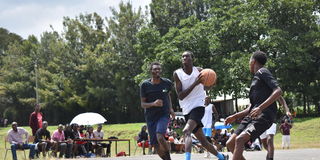The history of basketball in Nakuru

Aleer Francis going for a layup during their playoff game with Egerton University.
Talk about basketball in Nakuru to someone who is not a local and they might think that the sport is new to the county.
But anyone born and bred in the city with a passion for sports will tell you that basketball in Nakuru has a rich history dating back to the 70s.
It all started on the basketball court at Menengai High School, which has been the hub of this great sport in Nakuru and it goes without saying that it has served as a basketball talent academy for Nakuru.
Over the years, this court has been christened with names like Market Square Arena and Kapedo Grounds with the likes of Peter Odhiambo formerly of Barclays Bank, Gerald Nyaoma of Central Bank, Charles Nyaberi the current chairman of Kenya Volleyball Federation, Catherine Shava the late Caroline Omamo who went on to play in the United States of America and the Late Joseph Munuhe.
According to veteran basketball coach David Kamau alias Coach Deu, Basketball became popular in Nakuru in the 70s thanks to a Catholic father named Leo and the late Alfred Kamau of Menengai who was the chairman of the then Rift Valley Basketball Federation (RVBF).

David Kamau alias Coach Deu the coach of Gilgil Complex.
The first tournament hosted in Nakuru was a national tournament sponsored by the Canadian airline hence the name "Air Canada Tournament" and Nakuru basketball lovers flocked to Menengai High School to watch Kenya Commercial Bank, Barclays Bank, Kenya Cargo now Kenya Ports Authority lock horns in the game.
Air Canada pulled out and Nakuru was given the chance to host the Madaraka Day tournament.
In the early 80's Nakuru got it's first home team when Giant Corporation Posta formed a basketball team consisting of Gerald Nyaoma, H. Kagia, E. Maina, Mwangi Rhino.
Then Kenya Grain Growers Cooperative Union (K.G.G.C.U) now Kenya Farmers Association (KFA) formed a team, Egerton University also joined forming a team from the Lanet based forces known as the Falcons.
A group of talented school leavers from Nakuru Nursing Home formed a team known as the 89ners and then Gilgil complex a telephone assembly plant based in Gilgil formed a team through their C.E.O Noah Omanga.
The formation of these teams marked the birth of this great game in Nakuru.
K.G.G.C.U played in the national league in 1988 and in 1989 Gilgil Complex, led by Coach Deu, joined the league and made Nakuru Market Square their fortress with formidable players like Nyoso South and Tito.
The Gilgil Complex was then replaced by the Nakuru Railways team, soon after a group of basketball enthusiasts got together and formed the Nakuru Club, a unique team made up of the best of the best who would take on teams from Nairobi and Mombasa.
The self-funded team has been in existence for over 20 years and under the leadership of Richard Kanda has brought back the lost glory to Kapedo Grounds.
Coach Charles Arigi alias Chalo formed a team called Renegades and after two attempts won the play-offs qualifiers to join the national league.
Unfortunately, Nakuru Club were relegated two seasons ago and Renegades were forced to cease operations due to lack of funds.
Currently, Nakuru has one team in the Division 2 National League, Cabal Elitists, led by Peter Odhiambo aka Poison.
The game is slowly picking up steam and there seems to be hope for the sport after the launch of a local league three years ago called the Deep Crater League under the patronage of Fidel Ongolla. The league has 12 active teams.
The history of basketball in Nakuru is a fascinating one with its ups and downs, but the sport itself will always remain a constant.
